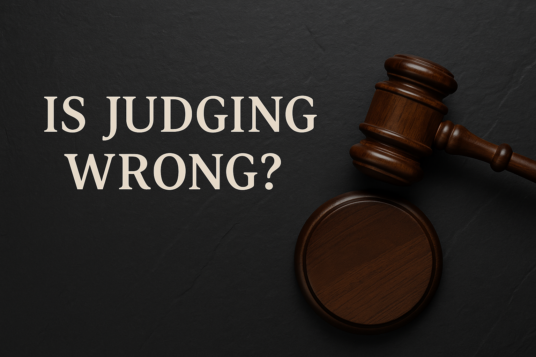Few words spark more discomfort in our age than judgment. Say it out loud in a conversation, and you’ll see people pull back, tense up, or push back. “Don’t judge me” is now a common defense. This is especially true in Western societies, which exalt individual freedom above nearly everything else.
Nowhere is this more pronounced than in the United States. We have so elevated the ideas of autonomy and self-definition. As a result, any challenge to one’s choices or behavior feels like a personal attack. The moment someone says, “That’s not right,” or “You shouldn’t do that,” the immediate response is often, “Who are you to judge?” It’s a symptom of the age: we confuse freedom with the absence of moral accountability.
But here’s the problem—judgment is not inherently wrong. In fact, it is necessary. Judgment is the engine of justice. You can’t uphold what is right without first evaluating what is wrong. There can be no righteousness without distinguishing it from unrighteousness. If we abandon judgment, we abandon justice itself.
Why Judgment Is Misunderstood
There are reasons why many today resist judgment; some are understandable, others less so. Many have endured judgment that was hypocritical, harsh, or cold. Some of the loudest moral voices have been exposed as frauds. People who held others to standards they themselves refused to live by. Naturally, this creates skepticism. Why listen to someone who doesn’t practice what they preach?
Others associate judgment with shame. When someone corrects us, we feel small, like failures. No one enjoys being told they’ve fallen short. But rather than responding with humility, we often respond with pride or defiance. The result is a culture that bristles at correction, even when it’s necessary.
Still deeper, yet, is the spiritual root of resistance: sin. Human nature recoils from accountability. Sin feeds our desire to do as we please, without interference. It tells us, “You’re fine the way you are. You don’t need to change. No one can tell you otherwise.” And so, any voice that calls us to reconsider our actions is seen as oppressive, even hateful.
What the Bible Actually Says
It’s true that the Bible warns against certain kinds of judgment—particularly judgment that is self-righteous, hypocritical, or condemning. Jesus said, “Judge not, that you be not judged” (Matthew 7:1), but He wasn’t outlawing all moral discernment. In fact, just a few verses later, He commands His followers to “take the log out of your own eye, and then you will see clearly to take the speck out of your brother’s eye” (v. 5). The issue isn’t judgment itself, but the heart and posture behind it.
Jesus, Paul, and the prophets—all made judgment calls. They confronted evil, corrected errors, and challenged the people. But they did so with a desire for truth, for righteousness, for repentance. Not to condemn, but to restore.
Righteous judgment is not a power grab. It’s not a means to feel morally superior. It is an act of love and courage. It means seeing clearly what is harmful, what is unjust, what is destructive—and speaking truthfully about it, in the hope that people can change for the better.
Redeeming Judgment
Judgment is a necessary part of growth. If no one can tell us we’re wrong, then no one can help us become right. If no one can confront evil, then evil will run wild. If no one can draw the line, the lines will vanish.
We, then, must learn to judge rightly—beginning with ourselves. Scripture commands us to examine our own hearts first, to repent, to grow, and to be watchful. That humility must always come first. But from that posture, we must also have the courage to judge wrongs.
Judgment, when done well, does not crush. It lifts. It helps people turn. That’s what we’re after—not shame, not superiority, but to right living.
In a culture of relativism, where every individual is their own authority and truth is up for grabs, Christians must not surrender the moral clarity that Scripture gives us. We must reclaim judgment—not as a weapon, but as a tool of love and formation.
Because if we refuse to judge, we refuse to care. And if we refuse to care, we lose the very thing that makes society just, churches holy, and people whole.
